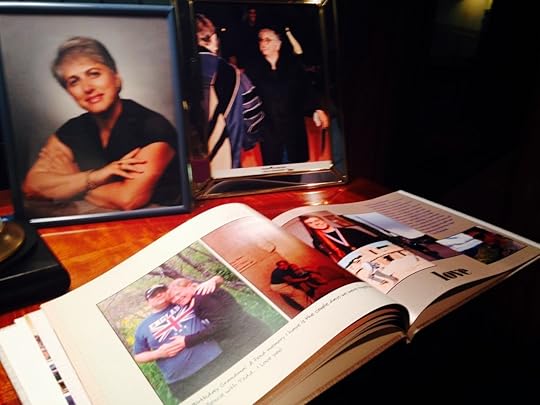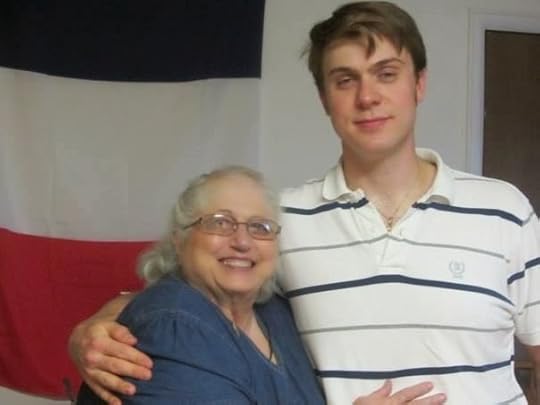
On Sat., January 11, my former mother-in-law, Rachel, died after being in a car accident. Doctors told us she was going to be fine. But she took a sudden turn for the worse, and within hours she was gone. The shock was overwhelming to everyone in the family.
Today, Sat., January 18, we said farewell to her. It was heartbreaking, especially to see the grief of her daughter, my former sister-in-law, with whom she was particularly close, and the grief of her grandchildren.
Not long ago, I saw a video where a father turned 60 photographs of his newborn son into a minute-long look at the baby’s first year of life. If one were to do this with Rachel’s life, the video would be 73 minutes long — shorter than the average Hollywood flick.
We always say that life is short, but it really is. At today’s service, I saw a former brother-in-law I haven’t seen for a decade. He lives in another state, and we have not stayed in touch. His kids are now teens and young adults. In the blink of an eye, they’ll be parents, and we will be the elderly generation — if we’re lucky.
I don’t think I’ve ever been aware how quickly a life can pass by. I remember meeting Rachel for the first time, remember laughing with her, remember looking for wedding gowns with her, remember her holding my first born for the first time. It seems like yesterday.
Rachel loved my books. She read them — and then said things about them that completely embarrassed my kids. No one wants to hear their grandmother talk about sex scenes from a book, especially their mother’s book. But Rachel was always open and honest, holding nothing back, even when other people might. She encouraged me in my career and my writing and told me more than once how proud she was of me and what I had done. It meant a lot to me.
I didn’t get to say farewell. All I could do was look at her body in a coffin and say goodbye that way. It sucked. I placed a scroll inside the coffin that contains the dedication to my next novel — it will be dedicated to her — and a print-out of a poem that she and Benjy had shared and enjoyed together.
One of my sons, in tears, asked me what the point of it all is. If we all die, then what’s the point of living in the first place, especially when no one can prove that anything exists beyond this life. (Such things are a matter of faith, not proven fact, he points out. He wants proof, facts, hard science.)
I think it’s fundamentally human to struggle with that question, and I’m not sure I was able to comfort him. I told him that NOW — this precious moment — is all that we have. Rather than building castles to our egos and slaving to gain wealth or fame or anything else, we ought to do our best to make a difference in the lives of others.
In other words, perhaps we should quit looking for the meaning of life and start living it, giving in service to others so that our existence has value to our fellow human beings.
If nothing we do is permanent, if we are guaranteed nothing beyond the breath we have just taken, then our most profound purpose ought to be to ease the suffering and the burden of all the other people who share this life and this moment with us. As Dickens said, we are all “fellow passengers to the grave.”
If we make a difference in another person’s experience of life, then we have lived our purpose in that moment.
My father once told me something that I found oddly comforting. In this culture of individualism, we all carry with us this great burden of trying to DO something, trying to BE something. When I was struggling with a particularly difficult period of my life he said, “Your life doesn’t belong to you anyway, so quit worrying about it.”
In our culture, a statement like that runs counter to everything we believe about what our lives should be. We focus on what we want, our hopes, our dreams. The idea that a life of service might be the most fulfilling option escapes most of us. If my life is just a borrowed gift, then suddenly there’s a lot less pressure to become what I am not, and a much greater call to serve, to live, to enjoy.
As Gandalf said, “All we have to decide is what to do with the time that is given to us.”
Life is so precious, so brief.
Forgive. Love. Laugh. Drop the petty stuff — who said what to whom and what you thought they meant by it. Who cares?
Live like you
mean it, not later, but
now.

Because Benjamin was unable to be with us at the funeral today — he is still teaching in Europe — he wrote a poem that was read at the service. It expresses so beautifully the unconditional love of a grandmother — and the child’s tendency to take those who love them for granted.
Fortunately, Benjamin did not take Rachel for granted, going out of his way to spend time with this grandmother. Rachel knew he loved her, and he knew she loved him. The photo above was taken during their last hour together at his farewell party before he left for Europe.
Who knew it was the last time they would see each other?
Here is his tribute to her.
It takes a lot of things
And a very long time
To make a grandma.
Start when you are very little.
Lots of love is the first ingredient.
You don’t know why she loves you,
But you accept it
Reaching up to her with stained hands.
Add the wonder of a tripto Grandma’s house,
Like visiting a foreign country.
A grandma is a special thing, but
You do not understand.
Now wait a few years.
You’re too old for kisses.
You’re a big kid,
And why does she ask so many questions?
About me, my life, what I’m doing.
You don’t know it yet,
But this is the next ingredient,
Even if it bothers you now.
This desire to know everything about you,
To be part of your life.You push back because
You still don’t understand.
But she persists for years.
Then, in an unexpected conversation,
You stumble on ingredients
You missed all those years.
Passions and interests
You never thought she had,
As if grandmas weren’t people.
You love photography too?
You like that movie also?
Add conversations that last for hours.
You don’t mind the questions anymore
Because you see other ingredients now
The birthday cards, the phone calls,
The inexplicable interest in your life.
You begin to understand.But not quite.
Now take away all those ingredients,
Every gesture, every question,
Even the ones that used to annoy you.
A silhouette, the lack of an image,
Is easier to see than the form itself.
It’s like that with grandmas.
All the ingredients,
Even ones you never recognized,
Stand out so clearly
Once they’re gone.
And it is only then that you see,
At long last,
What makes a grandma.
And you finally understand.
Rest in peace, Rachel. You are loved, and we miss you so much already.
 newest »
newest »
 newest »
newest »
 I read this quote the other day Pamela thought it fit. it said: "In the end we are all just walking eachother home". My condolences
I read this quote the other day Pamela thought it fit. it said: "In the end we are all just walking eachother home". My condolences
 What a beautiful tribute to Rachel! I only hope someone will say such beautiful things about my life someday. Benjamin's poem is beautiful.
What a beautiful tribute to Rachel! I only hope someone will say such beautiful things about my life someday. Benjamin's poem is beautiful.  Deepest condolences to you and your family. Love what your father said and what a lovely tribute to Rachel.
Deepest condolences to you and your family. Love what your father said and what a lovely tribute to Rachel.
 Thank you all so much, and thanks for reading my post. Your condolences, thoughts and prayers mean a lot to me.
Thank you all so much, and thanks for reading my post. Your condolences, thoughts and prayers mean a lot to me.  Soriya wrote: "I'm sorry for your loss. I wish you all the strengths and hopes to get through this."
Soriya wrote: "I'm sorry for your loss. I wish you all the strengths and hopes to get through this." Whitney wrote: "Sorry for your loss, sending you prayers & strength."
Whitney wrote: "Sorry for your loss, sending you prayers & strength." Sorry for your sudden loss, all we can do at such a hard time is look back on how they touched our heart & how they will be remembered. My thoughts & prayers are with you.
Sorry for your sudden loss, all we can do at such a hard time is look back on how they touched our heart & how they will be remembered. My thoughts & prayers are with you.
 That is a truly amazing tribute. Thank you for your insight and for sharing Benjamin's poem. So sorry for your loss.
That is a truly amazing tribute. Thank you for your insight and for sharing Benjamin's poem. So sorry for your loss.
 No one wants to hear their grandmother talk about sex scenes from a book, especially their mother’s book.
No one wants to hear their grandmother talk about sex scenes from a book, especially their mother’s book.












It sounds like Rachel readily shared her talents, effort and time with others. I think that is the highest calling--to be there.
And now a bit of her passes down through you and your son, whose lovely tribute brought tears to my eyes.
Sincerely,
Jennifer McGill-Sadera